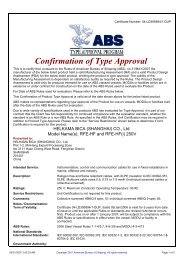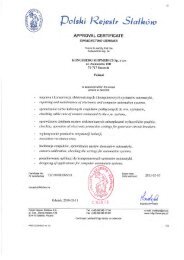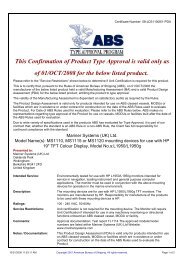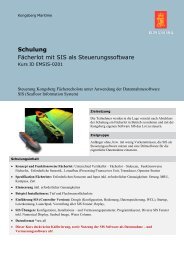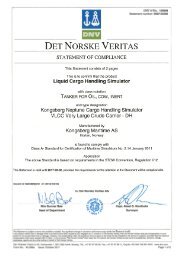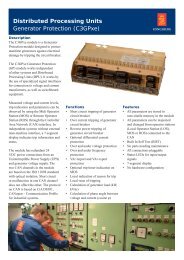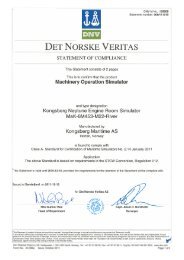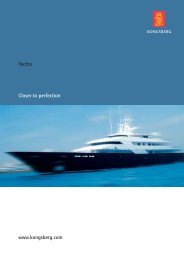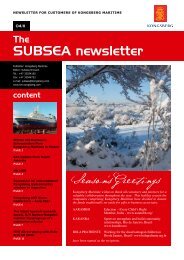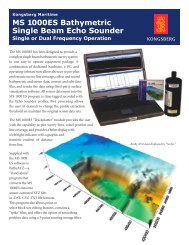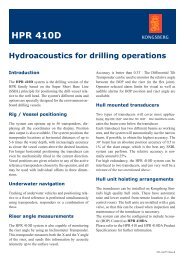Annual Report 2011 - Kongsberg Maritime - Kongsberg Gruppen
Annual Report 2011 - Kongsberg Maritime - Kongsberg Gruppen
Annual Report 2011 - Kongsberg Maritime - Kongsberg Gruppen
Create successful ePaper yourself
Turn your PDF publications into a flip-book with our unique Google optimized e-Paper software.
management. The same applies relative to important<br />
business associates. Arendals Fossekompani ASA, in which<br />
Erik Must directly and indirectly has a substantial stake,<br />
owned 7.96 per cent (7.96) of <strong>Kongsberg</strong> <strong>Gruppen</strong> ASA at<br />
year end. The Board of Directors is favourable to long-term<br />
shareholders being represented on the Board. There shall<br />
be no conflicts of interest between owners, the Board,<br />
management and the Group’s other stakeholders.<br />
Among the shareholder-elected directors, there are three<br />
men and two women, i.e. a 40 per cent women.<br />
Election of the Board of Directors<br />
The General Meeting elects the five shareholder-elected<br />
representatives to the Board. The Nominating Committee<br />
draws up a recommendation for the shareholders’ nominees<br />
to the Board in prior to the election. The recommendation<br />
of nominees is sent to the shareholders along with<br />
the notification of the General Meeting. Board elections<br />
take place by simple majority. The Norwegian State<br />
currently owns some 50 per cent of the shares, and could,<br />
in principle, control the election of the shareholder-elected<br />
directors. Three directors are elected directly by and from<br />
among the Group’s employees.<br />
The directors are elected for two-year terms and are<br />
eligible for re-election.<br />
The directors’ shareholdings<br />
At 31 December <strong>2011</strong>, the shareholder elected directors<br />
held the following portfolios of shares in the Group: Finn<br />
Jebsen, Chairman of the Board, owns 20 000 (20 000)<br />
shares through his wholly-owned enterprise Fateburet AS.<br />
Erik Must owns 124 600 (124 600) shares personally and<br />
400 000 (400 000) shares through Must Invest AS. John<br />
Giverholt owner 3 200 (3 200) shares personally.<br />
The employee-elected directors had the following<br />
holdings of KONGSBERG shares at 31 December <strong>2011</strong>.<br />
Roar Marthiniussen owned 4 268 (4 026 shares) personally.<br />
9. The Board’s work<br />
Board responsibilities<br />
The Board of Directors bears the ultimate responsibility for<br />
managing the Group and for monitoring day-to-day<br />
management and the Group’s business activities. This<br />
means that the Board is responsible for establishing control<br />
systems and for the Group operating in compliance with<br />
the adopted value platform and the Corporate Code of<br />
Ethics, as well as in accordance with the owners’ expectations<br />
of good corporate governance. First and foremost,<br />
the Board of Directors protects the interests of all shareholders,<br />
but it is also responsible for safeguarding the<br />
interests of the Group’s other stakeholders.<br />
Its main tasks are to contribute to corporate competitiveness,<br />
and to ensure that the Group develops and<br />
creates value. Further, the Board of Directors is to<br />
participate in the shaping of and adopt the Group’s<br />
strategy, exercising the requisite control functions and<br />
ensuring that the Group is well run and organised. The<br />
Board sets the objectives for financial structure and adopts<br />
the Group’s plans and budgets. The Board also handles<br />
items of major strategic or financial importance to the<br />
Group. In cases of substantial nature in which the chairmen<br />
and other board members have been actively engaged, this<br />
will be disclosed in the proceedings and considered by the<br />
Board in each case. These tasks are not constant and the<br />
focus will depend on the Group’s needs at any given time.<br />
The Board hires the CEO, defines his or her work instructions<br />
and authority, and sets his or her wages.<br />
Rules of procedure for the Board of Directors<br />
The Board’s rules of procedure are extensive and were<br />
most recently revised on 11 February <strong>2011</strong>. The rules cover<br />
the following items: the notification of Board meetings,<br />
notification deadlines, administrative preparations, Board<br />
meetings, Board decisions, the keeping of minutes, the<br />
Board’s competency and items on the Board’s agenda,<br />
segregation of duties between the Board and the CEO,<br />
relations between subsidiaries and the parent company,<br />
independence and disqualification, main principles for the<br />
work of the Board in connection with a possible corporate<br />
takeover, confidentiality and professional secrecy, relations<br />
to legislation, regulations and rules of procedure.<br />
The Board of Directors can decide to deviate from the<br />
rules of procedures in individual cases.<br />
Instructions for the CEO<br />
There is a clear segregation of duties between the Board<br />
and executive management. The Chairman is responsible<br />
for the Board’s work being conducted in an efficient,<br />
correct manner and in compliance with the Board’s terms<br />
of reference.<br />
The CEO is responsible for the Group’s operational<br />
management. The Board has prepared special instructions<br />
for the CEO, which were most recently revised on<br />
17 February 2010.<br />
Financial reporting<br />
The Board of Directors receives monthly financial reports<br />
and comments on the Group’s economic and financial<br />
status. The report is a financial presentation that describes<br />
what has happened in the Group’s operative and administrative<br />
functions during the reporting period. In connection<br />
with reporting on operations, the individual units shall held<br />
meetings to review operating activities. The business areas<br />
present their reports on operations to the Group Executive<br />
Board in separate meetings once reporting has been<br />
concluded.<br />
Quarterly financial reports are reviewed at board<br />
meetings, and these form the basis of the external financial<br />
reporting.<br />
Notice of meetings and discussion of items<br />
The Board schedules regular board meetings each year.<br />
2 INTRODUCTION<br />
7 DIRECTORS’ REPORT AND<br />
18 FINANCIAL STATEMENTS<br />
64 CORPORATE GOVERNANCE<br />
76 FINANCIAL CALENDAR AND ADDRESSES<br />
KONGSBERG <strong>Annual</strong> <strong>Report</strong> <strong>2011</strong> 71




